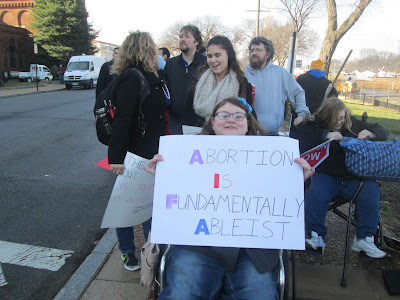Ableism, False Compassion, and Abortion
 |
| The author at the March for Life |
[Today’s guest post is by Rebecca Stapleford.]
A common trope of the pseudo-progressive idealization of late term abortion performed on disabled fetuses is this notion that it is a loving choice, the best choice for the child, who would assuredly be born into unimaginable suffering otherwise. Writer Miranda Sanchez, in her piece for the website Narratively, affirms this trope with a sickening vengeance when talking about the late term 20 week abortion she had performed on her son, because she felt like his life would not be worth living. Her doctors told her that “Their consensus is that he will probably live, but he will need spinal surgery every six months until he’s fully grown, and there are likely other complications unseen” and that “he may never walk or move his limbs outside of the womb.”
On account of this, Miranda and her husband, because they, in her words “value the quality of life, not the length of it” decide to abort her son. Sanchez and her husband never sought the advice of people who were born and living with her son’s condition. She never considered stepping outside of her position of able-bodied privilege and contemplating the fact that “quality of life” is relative and often based on ableist constructs and able-bodied privilege.
Worse still, Narratively’s largely progressive readers apparently saw nothing wrong with this mindset, congratulating the writer on her alleged “compassion” for her son and scolding a commenter who was born with a birth defect and was horrified by Sanchez’s ableism. The reality is, ableist narratives that privilege the opinions and beliefs of non-disabled parents and doctors above the disabled person’s own opinions about their quality of life are not progressive, they are regressive. Just because Sanchez, a relatively able-bodied person, would not find a life like her son’s to be worth living does not mean that he would share that opinion.
As a woman living with both developmental and physical disabilities, as a woman who was hospitalized for almost a year in high school, as a sister to a woman in a wheelchair, as a sister to another woman who is intellectually and physically disabled, as a friend to many other disabled people, some of whom suffer from chronic excruciating pain, narratives like the ones promoted with Sanchez fill me with rage. Yes, I am pro-life. Sanchez’s narcissistic little rant about doing whatever she wants with her body, which does nothing at all to explain why she should have the right to have her son’s body poisoned and dismembered like she did, is something that I obviously philosophically disagree with. However, if I were a die-hard pro-choicer, I would still find Sanchez’s ableism disturbing and her narrative oppressive. Judging from the number of disabled pro-choicers who have written about the underlying attitude of ableism in the pro-choice movement and how it contributes to the oppression of disabled people, I’m not alone.



Leave a Reply
Want to join the discussion?Feel free to contribute!